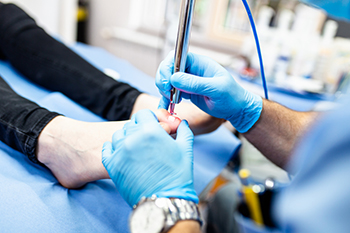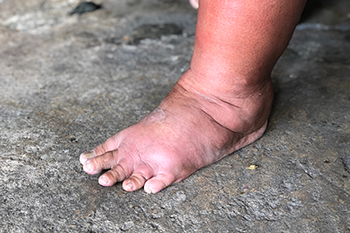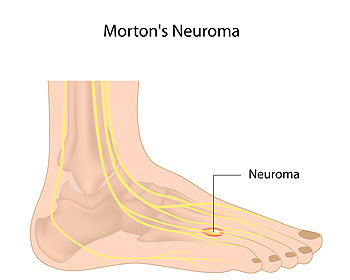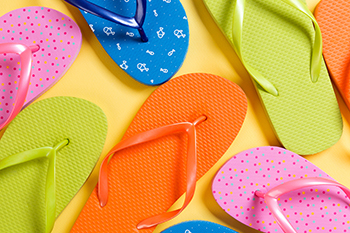Items filtered by date: July 2022
It's Time for Beautiful Feet
Why Laser Therapy Is Effective in Treating Toenail Fungus

Toenails are composed of layers and layers of keratin, which is a form of protein. Toe fungal microorganisms that cause a toenail infection can burrow themselves deep within these layers which make them difficult to kill. As the fungi feed off of the keratin in the infected nail, it becomes thickened, discolored, crumbly, ragged, and brittle. If the fungi embed themselves underneath the nail (in the nail bed), it can even cause the nail to lift off of the nail bed. Treating toenail fungus can be difficult as topical treatments can have a difficult time penetrating the nail to eradicate the fungus, and oral antifungal medications can sometimes cause dangerous side effects. Laser therapy for fungal toenails has emerged as an effective and safe treatment for toenail infections. The laser can precisely target the fungi and penetrate deep through the layers of nail to kill the fungi, without affecting surrounding healthy nail and tissue. If you have a stubborn toenail infection, it is suggested you call a podiatrist to see if you are a good candidate for laser therapy.
Laser treatment can be an effective way to get rid of toenail fungus. If you have any questions about laser treatment, consult with one of our podiatrists from Houston Foot and Ankle Care. Our doctors will assess your condition and provide you with quality treatment for fungal nails.
What Are Toenail Fungal Infections?
Onychomycosis, or fungal infection of the nail, is a relatively common and non-serious condition. Around 10 percent of U.S. citizens are afflicted with fungal nails. Common forms of fungus that infect the nail include dermatophytes, yeasts, and molds.
Symptoms of Toenail Fungal Infections Include:
- Nail thickening
- Brittleness of the nail
- Discoloration of the nail
Diagnosis for Fungal Nails
Fungal infections are diagnosed by fungal culture and microscopy. This will rule out any other conditions such as nail trauma, psoriasis, lichen planus, and onychogryphosis.
What Is Laser Treatment?
Laser treatment is a non-invasive, safe, quick, and painless procedure that uses the heat from a laser to kill fungus in the nail. Each infected nail is targeted with a laser for several minutes. The treatment is usually utilized several different times over a select period. During this time, a podiatrist will keep an eye on the infection.
If you have any questions, please feel free to contact our offices located in Inner Loop, Southwest, Greater Heights, and Pearland, TX . We offer the newest diagnostic and treatment technologies for all your foot care needs.
The Link Between Swollen Feet and Alcohol

Swelling can be a bothersome and annoying symptom for one to experience in their feet. Not only can it feel uncomfortable, but the swelling can also make it more difficult to walk and put weight on the feet. It is important for you to be aware of the different causes of swollen feet because, while this condition can be somewhat inconsequential in some cases, it can also point to serious underlying health complications in others. One of the often overlooked causes of swollen feet is related to the consumption of alcohol. When an individual drinks alcohol, especially in excessive quantities, this can cause them to retain water inside their bodies. This extra water retention can lead people to experience swelling in their feet. Swelling in the feet should subside within a couple of days. If it does not, then it could indicate a more serious problem with another part of the body, such as the kidney or liver. If you are beginning to experience swollen feet as a result of consuming alcohol, you might try elevating the feet to a height above the heart. This ultimately encourages and promotes blood circulation. To help counteract the swelling caused by alcohol, one might also try to reduce the amount of salt consumption. If you are experiencing swollen feet because of alcohol consumption, you can contact a podiatrist to receive help and learn more about how to treat this condition.
Swollen feet can be a sign of an underlying condition. If you have any concerns, contact one of our podiatrists of Houston Foot and Ankle Care. Our doctors can provide the care you need to keep you pain-free and on your feet.
Swollen feet are a common ailment among pregnant women and people who stand or sit for extended periods. Aging may increase the possibility of swollen feet and patients who are obese often notice when their feet are swelling too. There may be medical reasons why swollen feet occur:
- Phlebitis - A condition that causes the veins to become inflamed and can also cause leg pain.
- Liver disease - This may lead to low blood levels of albumin which is a protein. This can cause fluid in the blood to pass into the tissues and several areas of the body can become swollen.
- Heart failure - When the heart doesn’t pump properly the blood that is normally pumped back to the heart can pool in the veins of the legs causing swollen feet.
- Kidney disease - One of the main functions of the kidneys is releasing excess fluid in the body. This type of condition can make it difficult for the kidneys to function properly, and as a result the feet may become swollen.
- Deep-vein thrombosis (DVT)- This is a serious condition where blood clots form in the veins of the legs. They can block the return of blood from the legs to the heart which may cause the feet to swell. It is important to be treated by a podiatrist if this condition is present.
Swollen feet can also be caused by bone and tendon conditions, including fractures, arthritis, and tendinitis. Additionally, there may be skin and toenail conditions and an infection may cause the feet to swell. Patients who take medicine to treat high blood pressure may be prone to getting swollen feet.
Many patients elevate their feet to help relieve the swelling and this is generally a temporary remedy. When a podiatrist is consulted the reason behind the swelling can be uncovered and subsequently treated.
If you have any questions please feel free to contact our offices located in Inner Loop, Southwest, Greater Heights, and Pearland, TX . We offer the newest diagnostic tools and technology to treat your foot and ankle needs.
Who Is Affected by Morton’s Neuroma?

Just about anyone can develop Morton’s Neuroma, a foot ailment that can be particularly painful and troublesome. However, some individuals may be at an increased risk of developing this condition, so it is important to discern your own level of risk. Morton’s neuroma primarily affects plantar digital nerves that run between the metatarsal bones of the foot. In most cases, Morton’s neuroma targets the nerve between the third and fourth metatarsal bones, resulting in pain. Although the exact cause of Morton’s neuroma is somewhat elusive and largely case-dependent, it is most likely caused by either extended straining and compression of the plantar digital nerves or inflamed joints surrounding these nerves. Certain individuals can be more susceptible to Morton’s neuroma than others. For example, approximately 75% of those who suffer from this condition are women. This is most likely due to the fact that women wear shoes such as high heels that compress the toes, putting the plantar digital nerves at risk. Additionally, ballet dancers who wear similarly restrictive footwear are at an increased risk of developing Morton’s neuroma. Individuals between the ages of 40 and 50 are typically at the highest risk of developing this condition. If you believe you may have Morton’s neuroma or are in one of these high risk categories, you might consider contacting a podiatrist.
Morton’s neuroma is a very uncomfortable condition to live with. If you think you have Morton’s neuroma, contact one of our podiatrists of Houston Foot and Ankle Care. Our doctors will attend to all of your foot care needs and answer any of your related questions.
Morton’s Neuroma
Morton's neuroma is a painful foot condition that commonly affects the areas between the second and third or third and fourth toe, although other areas of the foot are also susceptible. Morton’s neuroma is caused by an inflamed nerve in the foot that is being squeezed and aggravated by surrounding bones.
What Increases the Chances of Having Morton’s Neuroma?
- Ill-fitting high heels or shoes that add pressure to the toe or foot
- Jogging, running or any sport that involves constant impact to the foot
- Flat feet, bunions, and any other foot deformities
Morton’s neuroma is a very treatable condition. Orthotics and shoe inserts can often be used to alleviate the pain on the forefront of the feet. In more severe cases, corticosteroids can also be prescribed. In order to figure out the best treatment for your neuroma, it’s recommended to seek the care of a podiatrist who can diagnose your condition and provide different treatment options.
If you have any questions, please feel free to contact our offices located in Inner Loop, Southwest, Greater Heights, and Pearland, TX . We offer the newest diagnostic and treatment technologies for all your foot care needs.
Flip Flops Can Be Fashionable but Harmful
As th e weather gets warmer and the summer season reaches its full stride, many individuals will slip on a pair of casual and seasonable flip-flops. Although flip-flops may seem like the perfect fashion statement for beach days and fun summer outings, wearing this kind of shoe for prolonged periods can yield detrimental consequences. Since one must constantly clench or tighten the toes to keep flip-flops from sliding off of the feet, wearing these shoes can negatively impact muscles in the feet and calves. Such muscular problems might even result in plantar fasciitis, causing pointed pains in the heels during physical activity such as running. Flip-flop use can create serious problems in other areas of the body including the knees. Experts recommend that flip-flops be worn for walking no more than relatively short distances. If one needs to walk more than this distance, a sandal with straps around the entire foot might prove to be a better option. Such sandals do not make the toes tighten to keep the shoe on the foot in the same way that flip-flops do. Regardless of the summer shoe you prefer, you might consider consulting with your podiatrist to ensure that your footwear choices are setting your feet up for success.
e weather gets warmer and the summer season reaches its full stride, many individuals will slip on a pair of casual and seasonable flip-flops. Although flip-flops may seem like the perfect fashion statement for beach days and fun summer outings, wearing this kind of shoe for prolonged periods can yield detrimental consequences. Since one must constantly clench or tighten the toes to keep flip-flops from sliding off of the feet, wearing these shoes can negatively impact muscles in the feet and calves. Such muscular problems might even result in plantar fasciitis, causing pointed pains in the heels during physical activity such as running. Flip-flop use can create serious problems in other areas of the body including the knees. Experts recommend that flip-flops be worn for walking no more than relatively short distances. If one needs to walk more than this distance, a sandal with straps around the entire foot might prove to be a better option. Such sandals do not make the toes tighten to keep the shoe on the foot in the same way that flip-flops do. Regardless of the summer shoe you prefer, you might consider consulting with your podiatrist to ensure that your footwear choices are setting your feet up for success.
Flip-flops are not always the best choice of footwear. If you have any concerns about your feet or ankles, contact one of our podiatrists from Houston Foot and Ankle Care. Our doctors will assist you with all of your foot and ankle needs.
Flip-Flops and Feet
When the weather starts warming up, people enjoy wearing flip-flops. Flip-flops are comfortable, stylish, and easy to slip on and off; they're perfect for any summer beach goer. However, these shoes can cause harm to the feet.
How Can Flip-Flops Affect Me Long-Term?
- Ankle problems
- Hip problems
- Lower back problems
- Pain in the balls of the feet
- Problems with foot arches
- Changes in the way you walk
Are There Injuries Associated with Flip-Flops?
Yes. Since flip-flops are relatively weak and do not provide the same amount of support as sneakers, people who wear flip-flops regularly are more susceptible to injuries. On top of that, the open nature of the shoe makes your feet more prone to other problems, such as cuts and even infections. Common injuries and ailments include:
- Sprained ankles
- Blisters
- Infections
- Cuts and Scrapes
I like Wearing Flip-Flops. Are There Safe Alternatives?
When buying flip-flops, try to find ones that have sturdy soles and that are made of high-quality materials that will support for your feet. These flip-flops will cost more but will also last longer as a result.
If you have any questions please feel free to contact our offices located in Inner Loop, Southwest, Greater Heights, and Pearland, TX . We offer the newest diagnostic and treatment technologies for all your foot and ankle needs.


